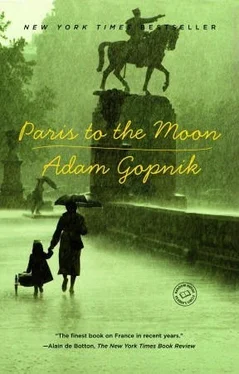Hostage taking of this kind has become more or less routine here, kidnapping the boss being to the French economic crisis what firing the employees was to the American one. Over the past few years a number of French bosses, including some at Moet et Chandon, have been held hostage. There’s actually a nice word for telling the patron to go to his room and stay there: He is merely being “sequestered,” which, as euphemisms go, seems a fair trade for the Anglo-Saxon downsizing.
The hostage takings, naturally, are almost entirely symbolic: If M. Meyssonier had really wanted to leave, he could have left. The melodrama of the “sequestration” was nonetheless mistaken by some foreign observers for the real thing. It’s easy to exaggerate the scale of the French crisis; the French do it themselves. The secondary, or symbolic, point of an action is often as clear as the primary, or practical, reality, and sometimes a lot clearer. At Christmastime in 1995 many journalists were enthralled by the masses of ordinary people who were out on the streets every day in the tens of thousands, symbolically showing their solidarity with striking Metro drivers. It was easy to miss the real point, which is that what everybody was doing on the streets was walking to work.
One economic problem is especially acute here: Unemployment-or chomage, as it’s called—has hovered around 12 percent for the last two years. Most of the other problems, the ones that create the sense of crisis, are anticipatory. They grow out of the fear that the right-wing government’s tentative attempts at reform will eventually corral France into an “Anglo-Saxon” economy, where an unleashed free market will make everybody do awful jobs for no money, forever. No one is reassured by the stridently triumphal tones of American free-marketers. After a recent trip to New York one French journalist remarked that leafing through a copy of Forbes or Fortune is like reading the operating manual of a strangely sanctimonious pirate ship.
These days one popular solution to the economic crisis is for everyone to stop working. The movement to lower the universal retirement age to fifty-five is the closest thing to a mass economic uprising that the country has seen; without the support of even the labor unions, to say nothing of the bemused parties of left or right, it is sweeping the country. It started last November, when striking truck drivers blockaded highways and ports to secure their right to retire at fifty-five. The government, faced with a choice between calling out the army and giving in, gave in. There was a general feeling that social justice had been done:
Truck drivers work long hours, away from their families, and letting them stop for good at fifty-five seemed fair.
Several weeks later people started to realize that after all, the truck drivers’ lot wasn’t that much harder than everybody else’s, and the idea of universal retirement at fifty-five really took flight. In January one of the public transportation unions decided to demand universal retirement at fifty-five, and despite the opposition of the respectable left, by mid-February a poll revealed that almost 70 percent of the population was in favor of stopping work at fifty-five.
The folie for fifty-five can be seen as a nice populist rebound on an idea first put forward by employers. For years businesses had been able to draw on a public fund (the Fonds National pour l’Emploi ) in order to encourage workers to take early retirement. At the same time, the idea of reducing the length of the workweek has been debated; many people, for instance, had proposed moving to a four-day week, so that a few young workers might be shoehorned in on Fridays. In the minds of many working people, though, the debate about a shorter workweek got mixed up with the truck drivers’ retirement coup, and the two together produced a sweeping, simple, plausible-sounding solution to the crise: Since the unemployed would benefit if everyone worked a little bit less, wouldn’t they benefit even more if everyone stopped working a lot sooner?
The national craze for early retirement may be an employees’ twist on an employers’ gimmick, but its roots are cultural. Retirement isn’t scary here. In America one unmentioned aspect of the Social Security debate is the feeling people have that to stop working is, in a sense, to stop living. It is the vestibule of death. In France there is no equivalent anxiety—and there are no great Florida-style gulags for the elderly. One of the striking things about Paris is that it is filled with old people who actually look old: bent, fitted out with canes, but dining and lunching and taking the air and walking their small, indifferent dogs along with everybody else. The humiliations visited on old people in America—dressed up like six-year-olds, in shorts and T-shirts and sneakers, imploding with rage—aren’t common here. The romance of retirement is strong. The right-wing daily Figaro, for instance, though editorially opposed to the move for very early retirement, ran a series of pieces about the “young retired”—people still in their forties or fifties who have managed to stop working. The series described people who at last have time to “reflect”; it was written in exactly the same admiring spirit that an American daily might use for a series about old people who are as busy as all get-out.
For Parisians the pleasure of quitting isn’t far to seek. Many of them come from the country—or, at least, feel attached to a particular village—so the idea of returning has a certain appeal. They are not being sent to Florida; they are just going home. People who remain here in town find that life becomes interesting when they stop working. Everyone who attends French public lectures knows that the most visible, and most audible, element in the crowd is the phalanx of the retired. Sometimes they present a bit of a problem, since they tend to be contentious, and when the subject comes within their purview—if it’s the Third Republic, say, or the Second World War—they feel free to speak up and correct the lecturer.
Not long ago somebody referred to the debate on Social Security in America as being distorted by “black helicopter” thinking. In France there is something that might be called “white helicopter” thinking. The American populist belief is that there is a secret multinational agency ready to swoop down from the skies and make everybody work for the government; the French populist belief is that there is a secret government agency that may yet swoop down from the skies and give everybody a larger pension.
L’Horreur Economique, the extreme manifesto of white helicopter thought, is the most successful book of the last several publishing seasons. A treatise by the novelist and essayist Viviane Forrester, it has sold a couple of hundred thousand copies in six months, and in November it won the Prix Medicis, which is a little like a French Pulitzer Prize. Forrester is a minor bellettrist whose earlier work included popular studies of Virginia Woolf and van Gogh. Not surprisingly, in L’Horreur Economique she has produced a work of political economy with all the economics, and most of the politics, left out. Unburdened by pie charts, statistics, or much else in the way of argument or evidence, the book is written in a tone of steady, murmuring apocalyptic dissent, with an occasional perky nod to a familiar neoliberal argument. The total effect is of a collaboration between Robert Reich and Rimbaud. Barely into the first chapter the author flatly announces that the logic of globalization will lead to an Auschwitz of the unemployed. “From exploitation to exclusion, from exclusion to elimination,” she writes. “Is it such an unlikely scenario?”
Читать дальше












